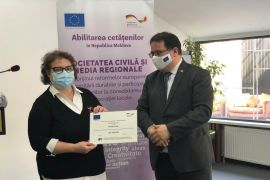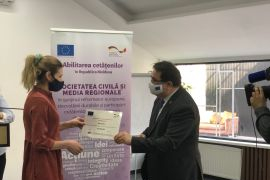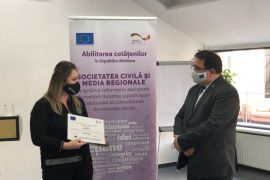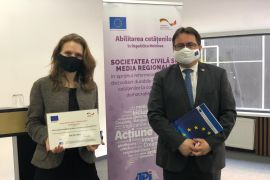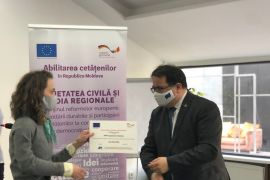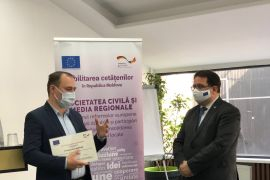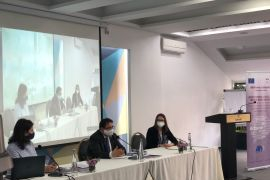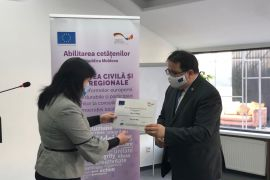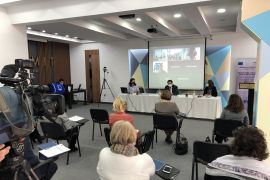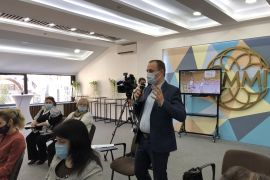back
Beneficiaries of EU Local Grants Program, Media and Communication, Second Call, Receive Grant Certificates
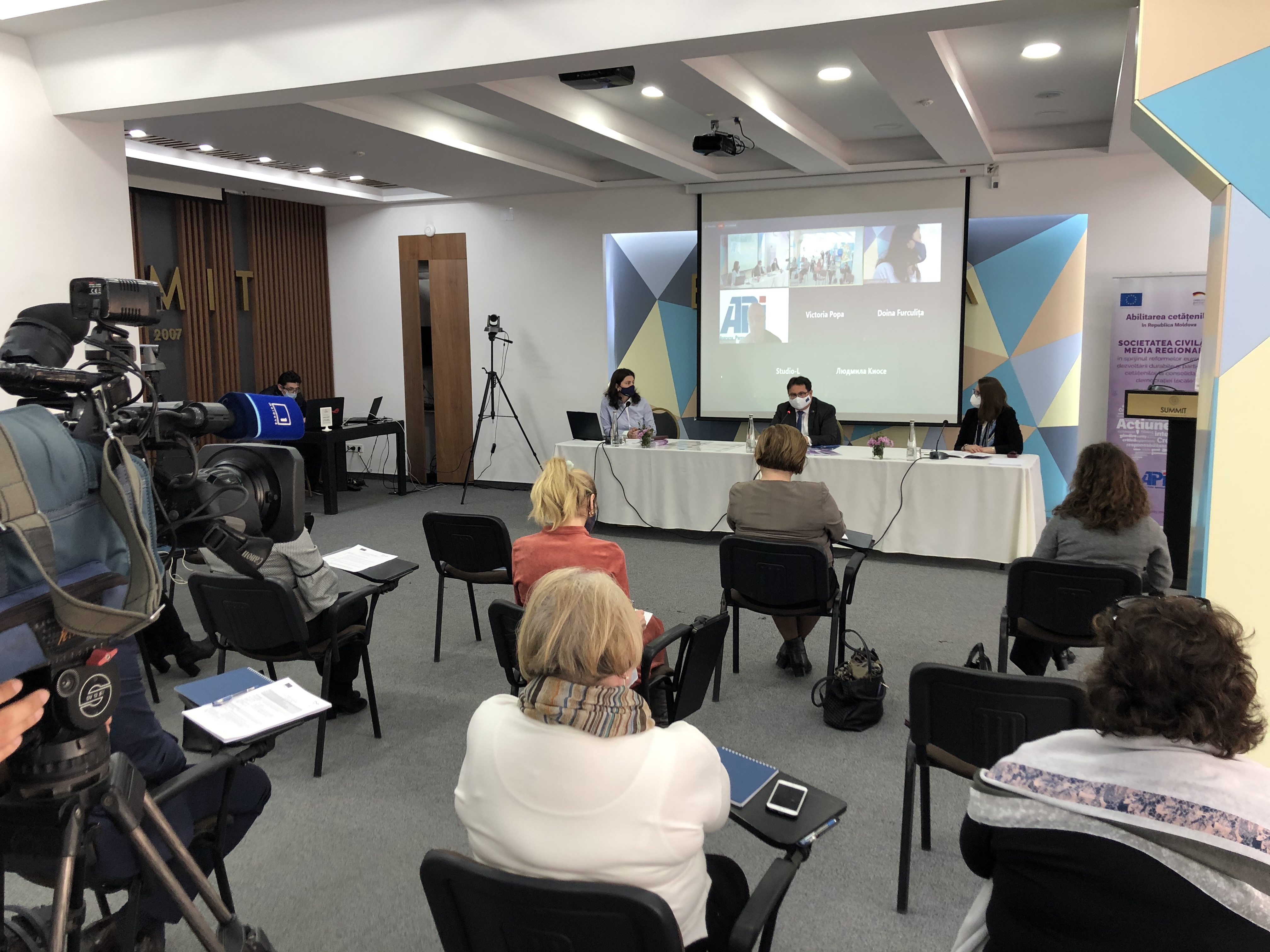
Photo: API
Seven non-governmental media organizations benefiting from the Second Call of the European Union's Local Grants Program, Media and Communication, received their grant certificates during a festive event, held on 11 March 2021 by the Association of Independent Press (API). The event was attended by H.E. Peter Michalko, Ambassador of the European Union to the Republic of Moldova, representatives of GIZ Moldova and media organizations.
Association of Environmental and Ecological Tourism Journalists (Ecopresa.md), Meridian Media Group (Radio EcoFM), TARSMI Civic Association (Tuk.md portal of Taraclia), local television stations Bas TV of Basarabeasca and Studio L of Causeni, and the periodicals Est Curier of Criuleni and Gazeta de Chișinău are the seven organizations that, for six months, will carry out information campaigns, mobilization and engagement of citizens in processes that contribute to improving their living conditions, especially in the fields of public services and environmental protection.
In his speech, Peter Michalko, EU Ambassador to Moldova, said that the EU would continue to support civil society organizations working to make Moldova a better place for people to live: "Citizens clearly want to get their information from independent and objective sources. Objective journalism is crucial, which is why the EU attaches great importance to press freedom, pluralism and protection of journalists' rights. This is the safeguard of a sound society in which citizens are well informed to make decisions, can form their own opinions about the events in the country and in their communities. The local and regional media are closer to people in the regions and we will support initiatives aimed at informing about EU-funded projects in areas relevant to people's quality of life, such as drinking water supply, sewerage, energy efficiency or other relevant environmental or socio-economic issues, which will also enhance people’s spirit of engagement.”
Elena Spânu, consultant on citizen empowerment at GIZ Moldova, referred to the role of civil society and the media for the sustainability of public services: “EU support for the development of quality services in Moldova and for engaging the society to ensure their sustainability is important, and the fact that we have already reached the second call for grants for media and communication proves good cooperation among civil society organizations, media outlets and development partners.”
“Media platforms may and should play a role in educating the society, especially in fragile democracies, such as the Republic of Moldova,” said Petru Macovei, API Executive Director. "Empowering citizens is not possible without the input of media outlets, especially of those in the regions. The projects selected for funding under this call address important community issues but the most important is citizen engagement, while media outlets may, using various approaches and media platforms, coagulate communities to address such issues.”
Representatives of media organizations have committed to doing everything possible to ensure the public has access to as many relevant and well-documented items on public services as possible.
Veaceslav Tutunaru, Civic Association “Media Grup Meridian”/ Radio Eco FM: “Quality public services are the key to ensuring a decent life in rural areas, and the level of population engagement in decision-making, monitoring and contributing to infrastructure development is essential. Through the shows and success stories we have set to achieve, we will explain to citizens that infrastructure development projects, implemented with EU support, cannot be implemented without the engagement of the population, and that social life and the well-being of the regions depends very much on the level of such engagement.”
Ludmila Topal, Bas TV, Basarabeasca: “Our citizens are not informed enough about the current problems of the community and do not understand well how they could be engage in decision-making. They do not know how public funds are used, how tariffs are formed and how the money they pay for utilities is used, so not everyone is aware of the responsibility for the regular payment of bills. Through the activities we have set to implement in the project, we hope to increase people's awareness of such processes, thus raising their sense of responsibility and civic awareness. In addition, we want to become a platform for dialogue between local authorities and the citizens in Basarabeasca district.”
Victoria Popa, the weekly Gazeta de Chișinău: “Quality services for citizens in fact mean a better life for them in their living settings. Through visits to villages, discussions with the residents and well-documented texts that we will publish, we will emphasize the need for and importance of public services for a better life in villages as well as the need to engage people for modernizing the localities.”
Anghelina Gaidarji, Tuk.md portal/ Tarsmi Civic Association, Taraclia: “By implementing this project, we want to develop a more conscious attitude towards public services in Taraclia residents. They will learn more not only about how service tariffs are formed but also about the costs incurred by municipal companies and local authorities. People will be informed and encouraged to engage, so that public services become more convenient and efficient, and the environment more protected.”
In the first Call for Grants, information activities are carried out by 14 non-governmental organizations across the country. Click on Api.md and Eu4civilsociety.md to follow how the beneficiary organizations will carry out their projects.
The Local Grants Program is launched under the Single Support Framework of the European Union (EU), granted to the Republic of Moldova (2017-2020) under the European Neighborhood Instrument, through the project "Empowering Citizens in the Republic of Moldova" (2019-2021), funded by the European Union and implemented by the German Agency for International Cooperation (GIZ). The project partner for increasing the potential of visibility and citizen engagement is the Association of Independent Press (API).
